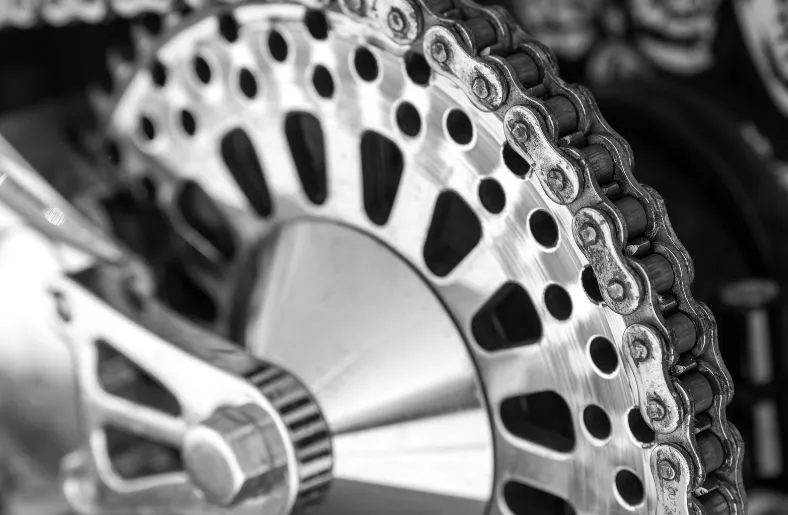Maintaining a clean and well-lubricated chain is essential for the performance, safety, and longevity of motorcycles, bicycles, industrial machinery, and more. Among the various methods and solvents available for cleaning chains, diesel, and kerosene are two commonly debated choices.
In this comprehensive blogpost, we will explore the use of diesel and kerosene for cleaning chains, weighing their pros and cons, and providing best practices to help you make an informed decision.
Table of Contents
Chain Cleaning Importance
Before we delve into the use of diesel and kerosene, it’s crucial to understand the importance of chain cleaning:
- Improved Performance: A clean chain ensures efficient power transmission from the engine or pedals to the wheels, enhancing overall performance.
- Safety: Regular chain maintenance reduces the risk of accidents caused by chain failure, such as snapping or derailing.
- Longevity: Proper cleaning and lubrication extend the lifespan of chains and sprockets, ultimately saving you money on replacements.
- Comfort: A well-maintained chain generates less noise and vibration, contributing to a smoother and more enjoyable riding or operating experience.
Diesel or Kerosene for Cleaning Chains?
Diesel for Chain Cleaning
Pros of Using Diesel:
- Effective Degreaser: Diesel fuel is an effective degreaser, capable of breaking down heavy grime, grease, and old chain lubricant.
- Readily Available: Diesel is widely available at gas stations and is often accessible in most parts of the world.
- Cost-Effective: Diesel is relatively inexpensive compared to specialized chain cleaning products.
- Minimal Environmental Impact: Diesel is less toxic than some other solvents and is less likely to harm the environment when disposed of correctly.
Cons of Using Diesel:
- Flammable: Diesel is highly flammable, posing a safety risk, particularly when used near open flames, sparks, or in poorly ventilated areas.
- Odor: Diesel has a strong and persistent odor that can be unpleasant when used in enclosed spaces or areas with poor ventilation.
- Not Environmentally Friendly: While diesel is less toxic than some solvents, it is not entirely environmentally friendly. Proper disposal is crucial to minimize its impact.
- Skin Irritation: Prolonged contact with diesel can irritate the skin, making it essential to wear gloves when handling it.
Kerosene for Chain Cleaning
Pros of Using Kerosene:
- Effective Degreaser: Like diesel, kerosene is an efficient degreaser capable of breaking down heavy grime and grease.
- Availability: Kerosene is typically available at hardware stores and is widely used for various cleaning and heating purposes.
- Cost-Effective: Kerosene is usually more affordable than specialized chain cleaning products.
- Lower Odor: While it does have a distinct odor, kerosene tends to have a milder smell than diesel.
Cons of Using Kerosene:
- Flammable: Kerosene is flammable, similar to diesel, and must be used with caution, especially near open flames or sparks.
- Skin Irritation: Kerosene can irritate the skin, so protective gloves should be worn during handling.
- Environmental Impact: Kerosene, like diesel, is not entirely environmentally friendly. Proper disposal is crucial to minimize its impact on the environment.
- Ventilation: Adequate ventilation is necessary when working with kerosene to avoid inhaling its fumes.
Using Diesel or Kerosene for Cleaning Chains: Best Practices
Regardless of whether you choose diesel or kerosene for chain cleaning, it’s essential to follow these best practices to ensure safety and effectiveness:
Safety Precautions:
- Wear Protective Gear: Always wear gloves and safety glasses when handling diesel or kerosene to protect your skin and eyes.
- Work in a Well-Ventilated Area: Ensure that you have proper ventilation when cleaning chains with these solvents to avoid inhaling fumes.
- Avoid Open Flames: Keep these solvents away from open flames, sparks, or any potential ignition sources.
- Dispose of Waste Responsibly: Dispose of used diesel or kerosene in an environmentally responsible manner, following local regulations and guidelines.
Cleaning Process:
- Remove Excess Grime: Use a stiff brush or a dedicated chain cleaning tool to remove loose dirt and grime from the chain before applying the solvent.
- Apply Diesel or Kerosene: Apply the chosen solvent to the chain. Use a chain-cleaning brush or a suitable tool to scrub the chain thoroughly. Pay attention to the links, rollers, and sprockets.
- Agitate and Soak: Allow the solvent to sit on the chain for a few minutes to penetrate and break down the grime. Agitate the chain with the brush to ensure thorough cleaning.
- Rinse and Dry: Rinse the chain with clean water to remove the solvent and loosened dirt. Allow the chain to air dry thoroughly before applying fresh chain lubricant.
Related Guide: Can You Clean a Motorcycle Chain with Soap and Water? A Comprehensive Guide (2023-2024)
Lubrication:
After cleaning, it’s essential to re-lubricate the chain promptly with a high-quality chain lubricant suitable for your specific riding or operating conditions.
Regular Maintenance:
Implement a regular chain maintenance schedule to keep your chain clean, lubricated, and in optimal condition. The frequency of cleaning and lubrication will depend on factors such as your riding habits and environmental conditions.
Conclusion
Both diesel and kerosene for cleaning chains can be effective degreasers when used correctly. However, it’s crucial to prioritize safety and follow best practices when working with these solvents. Always wear protective gear, work in a well-ventilated area, and exercise caution to prevent accidents.
While diesel and kerosene are cost-effective and readily available options, they are not entirely environmentally friendly and may have strong odors. Consider these factors when choosing a cleaning solvent for your chain maintenance needs. Ultimately, whether you opt for diesel or kerosene, regular and proper chain maintenance is key to ensuring the longevity, safety, and performance of your motorcycle, bicycle, or machinery.

